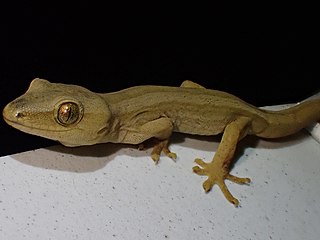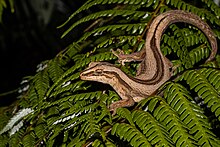
Hoplodactylus is a genus of geckos in the family Diplodactylidae. The genus is endemic to New Zealand, one of the seven genera of geckos found only in New Zealand. Hoplodactylus comprises two species of large to gigantic brownish lizards.

Duvaucel's gecko is a species of lizard in the family Diplodactylidae. The species is endemic to New Zealand and regarded as 'at risk' by the New Zealand Department of Conservation (DOC) due to distribution limitations.

Gigarcanum delcourti, formerly Hoplodactylus delcourti, is an extinct species of gecko in the family Diplodactylidae. It is the largest known of all geckos, with a snout-to-vent length (SVL) of 37 cm (14.6 in) and an overall length of at least 60 cm (23.6 in). It is only known from a single taxidermied specimen collected in the 19th century that was rediscovered unlabelled in a museum in France. The origin of the specimen was undocumented. While originally suggested to have been from New Zealand and the kawekaweau of Māori oral tradition, DNA evidence from the specimen suggests that it originates from New Caledonia.

The Auckland green gecko, also known as the elegant gecko, is a species of gecko found only in the northern half of the North Island of New Zealand, except north of Whangaroa.

The gold-striped gecko, gold-stripe gecko, or golden sticky-toed gecko is a species of gecko in the family Diplodactylidae. It is endemic to New Zealand, and is only found in the Taranaki region and Mana Island. The holotype is in the collection of the Museum of New Zealand Te Papa Tongarewa.

The Stephen's Island gecko, also known commonly as the Cook Strait striped gecko, Stephen's sticky-toed gecko, and the striped gecko, is a species of gecko in the genus Toropuku in the family Diplodactylidae. The species is endemic to New Zealand.

The forest gecko is a species of gecko that is endemic to New Zealand. Its Māori name is moko pirirākau. It is found in all parts of the country except the Far North and Canterbury. It is a protected species under the Wildlife Act 1953.

Woodworthia maculata, also known as the New Zealand common gecko or Raukawa gecko, is a species in the family Diplodactylidae. The species is endemic to New Zealand.

Dactylocnemis pacificus, the Pacific gecko or Pacific sticky-toed gecko, is a species in the family Gekkonidae, endemic to the North Island and offshore islands of New Zealand. D. pacificus is the only described species in the genus Dactylocnemis, but five offshore island forms may represent new species, one of which is the Mokohinau gecko.

The Tākitimu gecko is an endemic species of gecko in the family Diplodactylidae found in the Southland region of New Zealand. Tākitimu gecko were first described by Jewell and Leschen in 2004 as Hoplodactylus cryptozoicus.

The Diplodactylidae are a family in the suborder Gekkota (geckos), with over 150 species in 25 genera. These geckos occur in Australia, New Zealand, and New Caledonia. Diplodactylids are the most ecologically diverse and widespread family of geckos in both Australia and New Caledonia, and are the only family of geckos found in New Zealand. Three diplodactylid genera have recently been split into multiple new genera.
Hemidactylus inexpectatus is a species of house gecko from Oman.

Toropuku is a genus of lizards in the family Diplodactylidae endemic to New Zealand. It includes two species:

The Mokopirirakau genus comprises alpine geckos found only in New Zealand. The name is Māori, and comes from “Moko”, referring to lizards, and “pirirakau”, which refers to forests. This is a newly recognized genus as it was previously included in the Hoplodactylus genus. Many of the species within this genus are still at candidatus status because of this, but also because of the difficulty that comes with researching these species and this genus in particular. Much of the current research about geckos in New Zealand is built off assumptions, indicating that better surveying methods are needed to come to any real conclusions about their behaviour and ecology.

Woodworthia is a genus of geckos in the family Diplodactylidae endemic to New Zealand. It includes four formally described species, though as many as 17 genetically distinct species may exist. All species are native to New Zealand.

Pygopodoidea is a gecko superfamily and the only taxon in the gekkotan subclade Pygopodomorpha. The clade includes three Australasian families: Diplodactylidae, Carphodactylidae, and Pygopodidae. Traditional gekkotan systematics had considered Diplodactylidae and Carphodactylidae as subfamilies of the family Gekkonidae, but recent molecular work have placed Pygopodidae within Gekkonidae making it paraphyletic. These analyses have shown support of Pygopodidae and Carphodactylidae being sister taxa, with Diplodactylidae occupying a basal position in Pygopodoidea.

The Aupōuri green gecko, also known as the North Cape green gecko or yellow-lipped green gecko, is a species of gecko in the family Diplodactylidae. While the existence of the species was known for many years, it was undescribed until early 2021, with its scientific name being Naultinus 'North Cape' prior to description as N. flavirictus.

Hoplodactylus tohu, the Tohu gecko, is a species of lizard of the family Diplodactylidae. The lizard is found in the Marlborough Sounds / Cook Strait area of New Zealand.

The korowai gecko, also known as the Muriwai gecko, is a gecko found on the west coast of the Auckland Region of New Zealand. First discovered on Oaia Island in 1954, the species was recognised as distinct from Woodworthia maculata in 2016, and was formally described in 2023. Only 32 individuals are known to exist as of 2023, all within a very restricted range, on Te Korowai-o-Te-Tonga Peninsula, Muriwai Beach, Muriwai Regional Park and Oaia Island.















